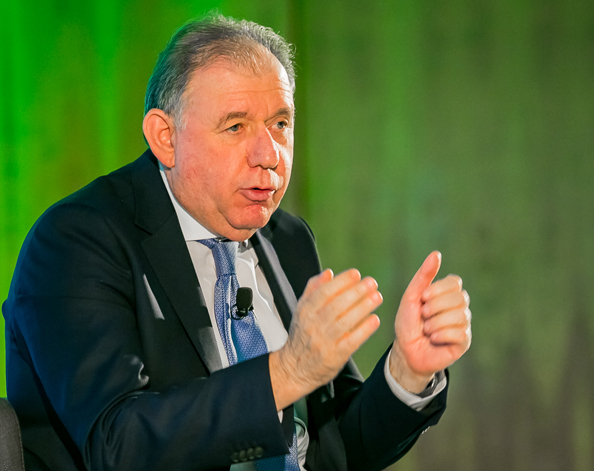Get Focus insights straight to your inbox
The eighth United Nations Sustainable Development Goal (SDG) promotes inclusive and sustainable economic growth, with its aim being decent work for all. Although there has been significant progress globally to ensure economic growth and work for all, emerging markets are still disproportionately impacted. With population expected to continue growing, it’s important that countries and businesses continue to encourage entrepreneurship and job creation to ensure decent work for all.
We spoke to Stephen Koseff, former CEO of Investec, to explore the challenges and opportunities that SDG 8 presents.
The two core components of SDG 8 are economic growth and employment. How do you see these two aligning?
Decent work is a consequence of economic growth. To enable an environment that provides business growth and increased employment opportunities, the socio-economic and political environment needs to be structurally positioned to do so. When aligned, it creates a virtuous cycle of growth, employment and uplifting societies, and ultimately provides further scope for growth.
We need to foster employment practices that are built on ensuring dignity of work; this includes providing opportunities for people to work and grow at globally competitive wages and potentially being supported by lower cost education and healthcare. Further, we need to build an understanding of the meaning of work, to have a purpose while receiving an income. Employment can be sought in the formal sector or through the informal sector, focusing on entrepreneurs and micro-enterprises, which all contribute to the informal economy and playing an important role in economic growth.
How did we get here?
Between 2004 and 2007, before the global financial crisis rocked the world, South Africa’s economy was growing at around 5-6% per annum, which enabled a debt-to-GDP ratio of below 30%, the creation of jobs and marked a real economic achievement in our country. We now sit with growth averaging 1% for the past three years, staggering debt-to-GDP levels and an inflated unemployment rate in excess of 30%. The question is, how do we get back to the previous levels of growth?
Our economy needs to be liberalised. Currently, we are constrained by bureaucracy and a multitude of structural constraints that hold us back, in addition to a lack of intellectual capital or “know how” across state institutions. We need structural and philosophical shifts within government, away from a developmental state and towards a growth state. People need freedom to move within boundaries. Partnerships with government, driven by business, need to deepen. Export zones need to be considered, in terms of removal of the minimum wage, in certain areas such as labour-intensive manufacturing, while importantly preserving dignity of work.
We need structural and philosophical shifts within government, away from a developmental state and towards a growth state.
Achieving this shift will entail having a multitude of short-term interventions focusing on creating jobs while maintaining a long-term focus on educating our people in a way that is aligned to the skills requirements of a modern economy. One example where partnerships (SDG 17) create true value is through the YES (Youth Employment Service) programme, which has created over 57,000 jobs in the past three years by giving unemployed youth training, experience and an income in sectors positioned for growth. The programme is funded by business. These numbers could be dramatically increased through greater corporate support and the relaxation of certain rules.
What can impede growth?
The developed world has a shortage of low skilled workers and thus it pays them to automate, however as a developing country, South Africa has an oversupply of low skilled workers that could fulfil these roles, should the conditions for employment be suitable. A high minimum wage can be counterproductive to growth for companies seeking enhanced profitability, including cost containment, while enabling automation for less linear expansion. If this cost-benefit gap is too wide, companies may direct their resources away from human capital and invest in technology instead. Lower minimum wages provide more space for human capital to enter the system, but this balance is difficult to navigate.
What are the opportunities for South Africa?
There are various factors, such as a well-positioned time zone, a largely English-speaking population and an abundant pipeline of talent and diversity that can be harnessed to take on a variety of roles within developing economies and across the world. Providing skills development, training and qualifications across sectors such as IT, including coding and programming, can unlock a significant pathway for employment opportunities within the gig economy. This expands to online client services and support centres, where jobs can be performed locally while serving a global audience.
Within our communities, we can create ecosystems to give birth to localised economic hubs. This may start with the provision of access to clean water (SDG 6), aiding in communities’ good health and wellbeing (SDG 3), unlocking opportunities for quality education (SDG 4) and farming / agricultural practices to provide food stability (SDG 2) as well as an income.
As a country, South Africa is well positioned to become a financial centre as a platform for Africa. This will in turn create employment opportunities, add value to the property sector and create demand, fostering a positive economic growth path for the country and the continent. To achieve this, work permits will need to be liberalised, providing concessions for senior leadership and other existing business requirements with a commitment to uplift and train people locally.

As a country, South Africa is well positioned to become a financial centre as a platform for Africa.
How can entrepreneurship contribute?
Our society used to be more unionised, however labour sectors within government have shifted the rules of engagement to bring about more partnerships, leading more people to build their own businesses and not necessarily form part of unions. Entrepreneurship creates jobs and growth 'out of nothing’ and plays a core role in achieving SDG 8.
Good ideas and good businesses will find the support they need. This may come through formal channels such as the SMME fund or informally through knocking on corporate and individual doors. If you can present yourself and your business case well, with a clear conviction and market positioning, there will always be at least one door that opens for you. Poor ideas present hindrances, not the lack of opportunities to find the support required.
Explain the intersectionality of gender equality (SDG 5), decent work and economic growth?
Women are critical role players in achieving economic growth. Historically, key forms of intensive labour such as mining and building, which made up a significant part of the economy, were predominantly taken up by men. However, this landscape continues to shift and in doing so, provides more equal opportunities for men and women to play a key role in contributing to the economy. One point of consideration is how women, together with their partners and/or families, balance the multiple roles and responsibilities held across family and career.
Companies should be mindful that their policies and practices provide support and flexibility across male and female employees, enabling working parents to find balance between both. Within underserved communities, where women are generally the primary caregiver to their children, the more support structures that are built such as early childhood development centres, that enable women to go out and find work, the greater our ability to expand our work force and be well positioned for economic growth.
Can we build a world on decent work and economic growth?
The targets of SDG 8 include somewhat idealistic figures, namely achieving GDP growth of 7% and zero unemployment. These may provide good direction as to what we should aspire to achieve, however we need to consider what success could look like. If we are able to achieve an unemployment rate of between 4% and 8% of the population actively seeking work with globally competitive wages, dignified working conditions and structural environments that foster growth, we will be well positioned to build a more inclusive and sustainable world.

Responsible Investing and Sustainability at Investec Wealth & Investment
As Sustainability is core to our fundamental investment approach, we have integrated ESG considerations into our investment decision making and broader investment process.




